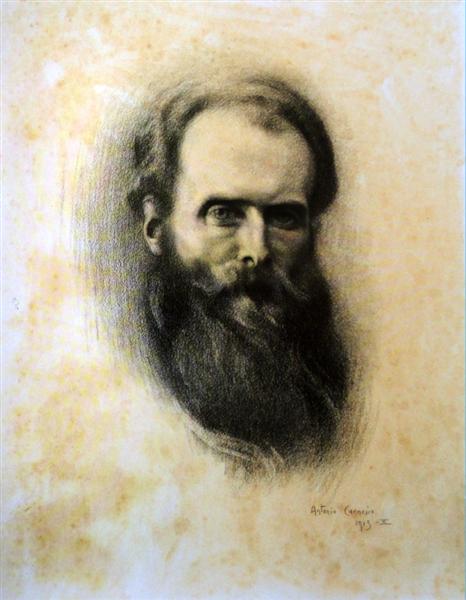Description
The work "auto-back" of António Carneiro, carried out in 1913, is a formidable representation of the introspection and complexity of the human being, characteristics that defined the aesthetic evolution of the artist throughout his career. Carneiro, recognized for being one of the most significant exponents of modernism in Portugal, uses this self -portrait to explore not only its own countenance, but also the concerns of a time when the country was at a crossroads between traditionalism and progress towards Modernism.
Observing the composition of the work, a dynamic tension between the gloomy and the bright is perceived. Carneiro is presented in the center of the fabric with an expression that travels from astonishment to contemplation. The use of a dark background, almost in gloom, highlights its face and, at the same time, generates an atmosphere of introspection. The use of a limited color accentuates the effectiveness of the representation; The terrible and dark tones, together with the use of white and gray, build a palette that reflects the sense of melancholy and introspection that dominates the work.
Carneiro's facial features are intensely expressive and seem to be loaded with deep reflection. The artist, when looking in the mirror, not only portrays his physiognomy, but intertwines his own emotions and his social context on the canvas. This emotional fragmentation is aligned with the tendencies of symbolism and modernism that permeated the European artistic movement at that time, where self -portrait becomes not only a technique of representation but also a means to investigate identity and subjectivity.
Carneiro, influenced by different movements, creates an aesthetic that could be linked to Fauvism due to its use of color, although it goes beyond a more personal and symbolic approach. The work also resonates with the tradition of self -portrait as a vehicle for self -examination, a practice that artists such as Vincent Van Gogh and Edvard Munch took to their climax in the nineteenth and early twentieth centuries. However, in "self-back", the artist Lisbon injects his unique perspective, marked by Portuguese historical reality and his own experiences.
Likewise, this self -portrait can be understood within the context of Carneiro's work, which includes portraits and themes of women, as well as landscapes that are imbued with an almost dreamlike sensitivity. His approach is often directed towards the representation of human essence, and "self-back" is a central piece that encapsulates his exploration of the individual in a world in transformation.
The intimate character and the introspective approach of this work make "self-back" not only a reflection of an individual, but a mirror of society and the tensions that inhabit it. Through this self -portrait, António Carneiro offers us a look at his inner world and, in turn, invites us to reflect on our own identities and the stories we carry inside. This painting remains relevant today, a reminder that art has the power to open dialogues about human existence and condition.
KUADROS ©, a famous paint on your wall.
Hand-made oil painting reproductions, with the quality of professional artists and the distinctive seal of KUADROS ©.
Art reproduction service with satisfaction guarantee. If you are not completely satisfied with the replica of your painting, we refund your money 100%.

